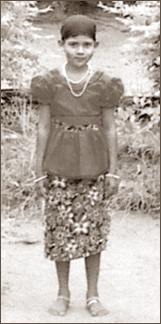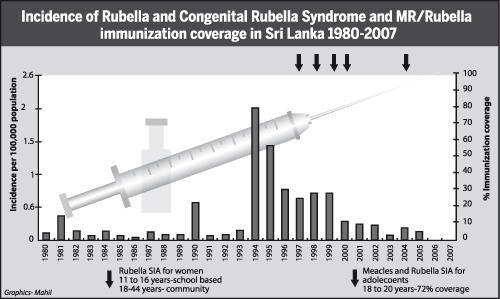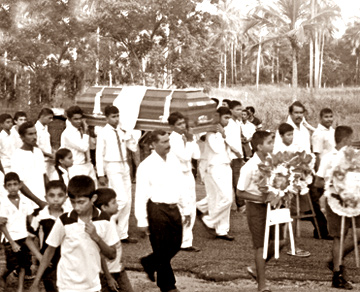Ashanthi's death, cause yet unknown
by Dhaneshi YATAWARA
 The parents visited the school the day following their child's
funeral. It was to invite the Principal, teachers and little one's
classmates to the seventh day remembrance - the ritual done to bring
good to the dead by the family and friends. For these parents, Dhammika
Anulawathi and Wasantha Premathilake, seeing schoolchildren and being in
the school brings a soothing touch to their wounded hearts with the loss
of their young daughter Ashanthi Wasana. The parents visited the school the day following their child's
funeral. It was to invite the Principal, teachers and little one's
classmates to the seventh day remembrance - the ritual done to bring
good to the dead by the family and friends. For these parents, Dhammika
Anulawathi and Wasantha Premathilake, seeing schoolchildren and being in
the school brings a soothing touch to their wounded hearts with the loss
of their young daughter Ashanthi Wasana.
Ashanthi was studying in grade eight at the Minuwangete Maha
Vidyalaya in Wariyapola and as the entire country was informed last week
she died tragically following the vaccination against Rubella. Whether
the vaccine has caused her death is yet unknown.
The loss
It is natural for the mother and the father to feel confused.
Ashanthi, as her father says was more attached to him. "I stayed back at
home on that Saturday while my daughter went to the MOH clinic at
Wariyapola with my wife," said Wasantha, an average worker currently
employed in the Deduru Oya water supply scheme.
Mother Dhammika, didn't know whether to cry or not. It is natural she
is the mother and for her loss of her child is more painful than its
cause.
"During the vaccination program at school on October 2, I came to the
school with her and told the Public Health Inspector who was there that
she is allergic to beef. There were several other children complaining
about different allergies. They were not given the vaccine there,"
Dhammika said recalling the series of events.
"Later we were informed by the school to go to the Office of the
Medical Officer of Health in Wariyapola to get the vaccine on Saturday
(October 10).
So we went there and several children from Wariyapola were there to
get the vaccination," she explained.
 "We found she was allergic to beef only after she was five years old.
She gets a rash on the skin and becomes itchy," the mother said. "We found she was allergic to beef only after she was five years old.
She gets a rash on the skin and becomes itchy," the mother said.
After vaccination the children were asked to stay back for about half
an hour and those who were normal were given the permission to leave.
"At the bus stand my daughter said she feels itchy and I rushed back
to the MOH office. There they gave her medicine and asked her to stay
relaxed until she was ok. She was feeling uneasy so they asked her to
lie down and she did," Dhammika said.It was only after several minutes
the girl fainted. And the staff rushed her to the Wariyapola Hospital
which was in close proximity.
"The doctors and nurses did their best. I saw that. And by twelve,
without delaying they sent my daughter to the Kurunegala Hospital with a
doctor as well. And I accompanied them," she said.
By this time she had managed to inform her husband and asked him to
come to Kurunegala. At the Kurunegala Teaching Hospital she was admitted
to the emergency ward and was given treatment immediately. Then she was
admitted to the Intensive Care Unit.
"Around eight that night (Saturday) she regained consciousness and
the nurses asked me to go and talk to the child. I went and she wanted
rice to eat. Everything was well taken care of at the hospital. And the
doctors did not recommend heavy food for her. She talked in a drowsy
manner," Dhammika explained.
They stayed the next day, Sunday where the child was well looked
after. But on Tuesday the girl died.
Thorough investigation
"We are conducting a thorough investigation into the incident," said
Doctor Rajiva de Silva, Immunologist of the Medical Research Institute (MRI)
who is a member of the investigating committee.
"The actual cause of the death is yet to be known and an allergy is
just one possibility. It may be an allergy or may be not," Dr. de Silva
added.
Under the directive of the Minister of Health and Nutrition the
Ministry set up an investigative team comprising experts. Dr. Sriyani
Dissanayake of the Epidemiological Unit of the Ministry, Dr. Shalini Sri
Renganathan of the Pharmacology Dept of the Colombo Medical Faculty, Dr.
Nishali Ekanayake Consultant Pathologist, Colombo Judicial Medical
Officer Ananda Samarasekara and Dr. Omala Wimalarathne, Virologist of
MRI.
|

Ashanthi’s final walk with teachers and friends
Pix: Champika Perera |
Under the instructions of the Secretary to the Health Ministry Dr.
Athula Kahandaliyanage the team is conducting site visits, collecting
samples giving a personal attention to every aspect of the incident.
"In addition, according to the legal sources a court case is also
being conducted on this sudden death separately," Dr.Omala Wimalarathne,
Virologist of the MRI said.
"We can't predict when people will develop allergies. Some people may
not show allergies in their early stages of life but later. Anybody can
develop allergies. Our immunity system also changes as we grow. So the
way we react to the environment also changes with our age," she said
explaining an allergy in general terms.
Due to these reasons, during the vaccination programs an emergency
tray should be kept by the side, hence if any person develops an allergy
the doctor will give the counteractive drug without delay. "This is laid
down by the Epidemiology Unit through a circular to the entire health
sector," Dr. Wimalarathne said.
The allergy can be either mild or severe. The most dangerous one is
the anaphylactic reaction which the child was believed to have
developed.
"When vaccines are given orally, it needs some time to get absorbed
in to the blood system through digestion. So there is a grace period.
But especially when it is injected the reaction is very quick. When
injected, it need not be from a syringe or even by a bee sting, it
enters straight into the system and the immune system get stimulated
faster," she explained.
"There are prescribed drugs which one has to give to the patient if
an allergy occurs. There are different drugs to be given at different
stages to counteract the allergy.
Whether it is Government or private hospital this condition should be
adhere to. Wherever patients are treated we have to safeguard their
lives," she said.
The Rubella vaccine was started in 2001 under the Expanded
Immunization program to which the Epidemiology Unit of the Ministry of
Health and the Family Health Bureau are mainly responsible.
The danger subsided
Rubella disease is considered important because of its ability to
produce anomalies in the developing foetus. Rubella infection in early
pregnancy, especially during the first trimester, often results in
miscarriages and still births.
Congenital Rubella Syndrome (CRS) occurs in up to 85% of infants born
to women who acquire rubella infection during this period. Infants born
with CRS may have blindness, deafness, cardiac malformation,
microcephaly (small brain), mental retardation and behaviourial
problems. Those who survive the neonatal period may face serious
developmental disabilities and have an increased risk for developmental
delays, including autism, diabetes mellitus and thyroiditis.
According to health reports there was an epidemic of congenital
rubella syndrome in Sri Lanka during 1994 and 1995. A survey done in
1995 by the health authorities has revealed that there were 275 cases of
CRS in 1994 and a further 169 cases in the first four months of 1995.
During the first phase of Rubella vaccine introduction, from 1996 to
2001, rubella vaccine was introduced to all females aged between 11 to
44 years of age.
In 2001, it was decided to introduce rubella vaccine to both males
and females at three years as combined Measles and Rubella vaccine
"The problem is if a male gets infected he will transmit it to the
female. If a husband or the son gets it, it is possible they will give
the wife or the daughter the illness.
That is the reason why we started vaccinating males as well," Dr.
Omala Wimalarathne explained.
Further in 2001, to reduce the immunization gap it was decided to
administer rubella vaccine to all children, both males and females, at
the age of eight years in the schools instead of 11 years. From 2006
onwards all children are receiving two doses of rubella at three years
and 13 years.
The impact of immunization program on reduction in CRS is well
evident by the fact that, in 2007 and 2008, not a single case of
congenital rubella syndrome has been reported in Sri Lanka.
Extra caution
"We are responsible authorities and we do not want to give a low
quality vaccine for the people, especially in the case of children we
are extra careful," Dr. Wimalarathne said.
The Epidemiology Unit has instructed (through a circular) not to
vaccinate a child if he/she has a history of allergies, wheezing,
previous medical problem even during birth etc.
At the recent tragedy 37 children including the dead child were
referred to the MOH clinic of the area.MRI is the national control
laboratory for vaccines.
The World Health Organization (WHO) has also recognized it. In
addition to the assistance and training continuously extended by the WHO
to the MRI, every two years a WHO team visits the MRI where every detail
of work is assessed and analyzed. "We are totally answerable to every
action taken,"Dr. Omala Wimalarathne explained.
The WHO conducts their own testing in the factories of vaccine
manufacturers, especially of the manufacturers who provide vaccines for
the countries of the developing world or those countries without proper
facilities for testing.
The vaccines supplied to Expanded Programs on immunization (EPI)
around world are quality tested.
Tedious standards
"In the import of vaccine under the EPI program, we have put a bench
mark where the manufacturer needs to be pre-qualified by the World
Health Organization. It is only such manufacturers who can get
registered with the authorities," Dr. Wimalarathne said.
"Since we are required to conform to WHO standards we have to inform
them of any errors or deaths in the immunization programs," she added.
Sri Lankan health authorities do not register vaccine manufacturers
without the WHO prequalification. The registration procedure is very
tedious. For vaccines importing is a long procedure.
There are testings done before the shipment arrive and checks whether
the criteria are met with ours. "When it comes to vaccines we are extra
careful since we are responsible for the lives of each and every
citizen," Dr. Wimalarathne added.
At this stage we can only wait for a final report on a proper
investigation until the true cause of death of Ashanthi Wasana is
revealed even after giving the counteractive treatment. |

